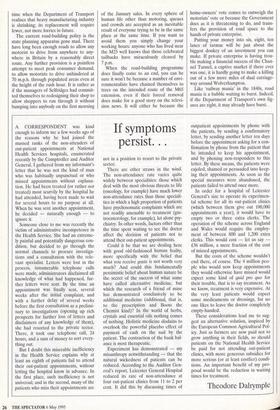If symptoms persist. . .
A CORRESPONDENT was kind enough to inform me a few weeks ago of the reasons why he had joined the massed ranks of the non-attenders of out-patient appointments at National Health Services hospitals, enumerated recently by the Comptroller and Auditor General. I gathered from my informant's letter that he was not the kind of man who was habitually unpunctual or who missed appointments without explana- tion. He had been treated (or rather not treated) most scurvily by the hospital he had attended, having been made to wait for several hours to no purpose at all. When he was sent another appointment, he decided — naturally enough — to ignore it.
Someone close to me was recently the victim of administrative incompetence in the Health Service. She had an extreme- ly painful and potentially dangerous con- dition, but decided to go through the normal channels to procure investiga- tions and a consultation with the rele- vant specialist. Letters were lost in the process, innumerable telephone calls were made, administrators disclaimed all knowledge of what had happened, fur- ther letters were sent. By the time an appointment was finally sent, several weeks after the initial complaint, and with a further delay of several weeks before the first consultation as a prelimi- nary to investigations (opening up rich prospects for further loss of letters and disclaimers of any knowledge of them), she had resorted to the private sector. There, it took one telephone call, 24 hours, and a sum of money to sort every- thing out.
But I doubt this miserable inefficiency in the Health Service explains why at least an eighth of patients fail to attend their out-patient appointments, without letting the hospital know in advance. In the first place, such inefficiency is not universal; and in the second, many of the patients who miss their appointments are not in a position to resort to the private sector.
There are other straws in the wind. The non-attendance rate varies quite widely between specialities: those which deal with the most obvious threats to life (oncology, for example) have much lower non-attendance rates than those speciali- ties in which a high proportion of patients have psychosomatic complaints which are not readily amenable to treatment (gas- troenterology, for example), let alone psy- chiatry. In other words, factors other than the time spent waiting to see the doctor affect the decision of patients not to attend their out-patient appointments.
Could it be that we are dealing here with good old-fashioned human frailty, more specifically with the belief that what you receive gratis is not worth very much? And could this fundamentally pessimistic belief about human nature be the secret of the success of what some have called alternative medicine, but which the research of a friend of mine has demonstrated conclusively to be additional medicine (additional, that is, to the prescription and Boots the Chemist kind)? In the world of herbs, crystals and essential oils nothing comes of nothing. Holistic medicine disdains to overlook the powerful placebo effect of payment of cash on the nail by the patient. The contraction of the bank bal- ance is most therapeutic.
Experiment has demonstrated — my misanthropy notwithstanding — that the natural wickedness of patients can be reduced. According to the Auditor Gen- eral's report, Leicester General Hospital reduced its rate of non-attendance at four out-patient clinics from 11 to 2 per cent. It did this by discussing times of outpatient appointments by phone with the patients, by sending a confirmatory letter, by sending another letter ten days before the appointment asking for a con- firmation by phone from the patient that he intended to keep his appointment, and by phoning non-responders to this letter. By these means, the patients were cajoled, shamed or persuaded into keep- ing their appointments. As soon as the special measures were abandoned, the patients failed to attend once more.
In order for a hospital of Leicester General's size to operate its experimen- tal scheme for all its out-patient clinics (which between them give out 100,000 appointments a year), it would have to empty two or three extra clerks. The operation of the scheme across England and Wales would require the employ- ment of between 800 and 1,200 extra clerks. This would cost — let us say £36 million, a mere fraction of the cost of missed appointments.
But the costs of the scheme wouldn't end there, of course. The 4 million peo- ple who would now keep appointments they would otherwise have missed would expect some kind of quid pro quo for their trouble, that is to say treatment. As we know, treatment is very expensive. At the very least patients would expect some medicaments or dressings, for no one likes to leave the doctor completely empty-handed.
These considerations lead me to sug- gest an alternative solution, inspired by the European Common Agricultural Pol- icy. Just as farmers are now paid not to grow anything in their fields, so should patients on the National Health Service be paid for not attending out-patient clinics, with more generous subsidies for more serious (or at least costlier) condi- tions. An important benefit of my pro- posal would be the reduction in waiting times for treatment.
Theodore Dalrymple


































































 Previous page
Previous page